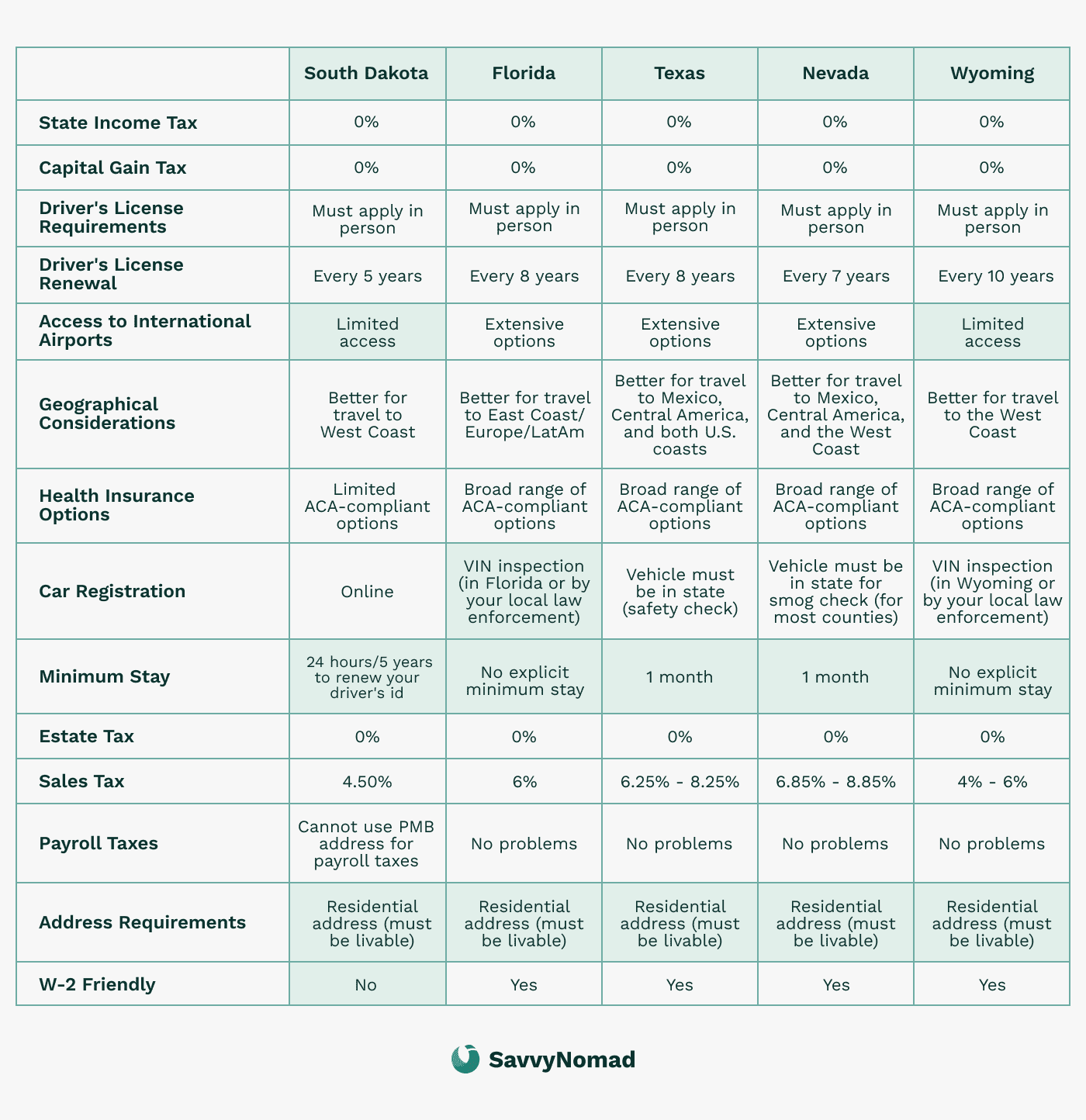Do expats from South Carolina still need to pay state taxes?

It is important to understand your state tax obligations when you move abroad. Even if you no longer live in South Carolina, you might still need to pay state taxes. Knowing the rules can help you avoid unexpected bills and ensure you comply with the law.
TLDR:
If South Carolina remains your domicile and you haven't established residency elsewhere, you are considered a South Carolina resident for tax purposes and must file state taxes on your worldwide income.
To avoid this, sever all ties with South Carolina, such as selling property, transferring your driver’s license, registering to vote in your new state, and establishing a new domicile.
Non-compliance with South Carolina state tax laws can result in significant financial penalties, legal risks, reputational damage, and operational disruptions.
Understanding South Carolina's tax residency rules
When it comes to paying state taxes, South Carolina classifies people into three groups: Residents, Nonresidents, and Part-Year Residents.
Resident
A Resident is someone whose permanent home, or domicile, is in South Carolina. If you are a Resident, you must pay taxes on all your income, no matter where you earned it, both within and outside the United States.
Nonresident
A Nonresident is someone who does not have a permanent home or significant presence in South Carolina. Nonresidents only pay taxes on income that comes from South Carolina sources. This includes money you make from working in South Carolina or income from property located in the state.
Part-Year Resident
If you move to or from South Carolina during the year, you are considered a Part-Year Resident. As a Part-Year Resident, you pay taxes on all the income you earned while you lived in South Carolina. For the time you were not a resident, you only pay taxes on income from South Carolina sources.
Domicile and its implications
Your domicile is your permanent home, the place you intend to return to after being away. Your domicile plays a key role in determining your tax obligations. If South Carolina is your domicile, you are considered a resident for tax purposes, even if you are living abroad.
To change your domicile and avoid South Carolina taxes, you must take steps to establish a new domicile in another state or country.
Here are some steps to help you:
- Sell Property: Sell any property you own in South Carolina.
- Transfer Driver’s License and Vehicle Registration: Get a driver’s license and register your vehicle in your new state.
- Register to Vote: Register to vote in your new state.
- Establish a New Domicile: Show that you intend to make your new location your permanent home.
What constitutes South Carolina-sourced income?
Understanding what constitutes South Carolina-sourced income is essential for nonresidents and part-year residents to determine your tax obligations accurately.
South Carolina-sourced income refers to any income derived from activities or assets located within the state.
Here are some key categories to consider:
- Wages and Salaries: Money earned for services performed in South Carolina.
- Business Income: Income from business activities conducted in South Carolina.
- Real Estate: Rental income from property located in South Carolina.
- Capital Gains: Profits from the sale of real estate or tangible property in South Carolina.
Why should South Carolina expats move domicile to a state with zero state income tax?
State income tax savings
For retirees and high-income individuals from South Carolina, moving to states without income taxes such as Florida, Texas, or Nevada can offer significant financial advantages.
Without the burden of South Carolina state income taxes, you can keep more of your earnings, allowing for greater investment opportunities or an enhanced lifestyle.
Inheritance tax benefits
States like Florida and Texas lack a state income tax and do not impose state estate taxes. This can considerably reduce the tax burden on your estate, ensuring that more wealth is passed on to your heirs. This is especially advantageous for individuals from South Carolina with substantial assets who wish to maximize the inheritance for their beneficiaries.
Flexibility and mobility
Relocating your domicile from South Carolina to a no-income-tax state enhances your flexibility and mobility, allowing you to travel and live in various locations without worrying about high state tax bills.
This is ideal for high-income earners from South Carolina with business interests in multiple states or countries and for retirees who desire to spend their later years exploring new places.
Moreover, the absence of state income taxes simplifies your tax filing process. You will only need to file federal taxes, reducing the complexity and potential for errors in your tax returns, making financial management more straightforward.

How to leave South Carolina tax residency?
When moving abroad or to another state, changing your South Carolina residency status requires deliberate steps to ensure a clear transition.
Here’s a step-by-step guide to help you navigate this process:
1) Establish new residency
- Secure a Residential Address: Find a place to live in your new state or country. This address will be your new domicile.
- File a Declaration of Domicile if required: Some states, like Florida, require a formal declaration to confirm your new domicile.
Reference guides may provide additional help for specific states:

2) Transfer IDs and registrations
Get a driver’s license and register your vehicle in your new state as soon as possible. This is a strong indicator of your new residency
3) Register to vote
Sign up to vote in your new state. Voter registration is an important step in demonstrating your new domicile.
4) Update documents
Change your address on all personal documents, including identification cards, medical records, insurance policies, and financial documents.
Ensure all your personal documents reflect your new address to avoid any issues and to provide proof of your move.
5) Notify your employer
Let your employer know about your change of residence. This can affect how your income is taxed.
6) Notify IRS
Inform the IRS of your address change using Form 8822. Extend this notification to all personal and professional entities.
7) Keep records
Maintain detailed records of all your relocation actions, including receipts, bills, and legal documents. These States may conduct residency audits to ensure your move is genuine. Keep detailed evidence like utility bills, voter registration, and proof of domicile .
8) Be prepared for audit
Be ready to provide proof of your move’s permanence. This includes all the documentation showing that you have established a new domicile and severed ties with South Carolina.

Tax benefits and exemptions for expats from South Carolina
Living abroad can offer several tax benefits and exemptions that can help reduce your overall tax burden. Here are some of the key tax benefits available to expats from South Carolina:
Foreign Earned Income Exclusion (FEIE)
The Foreign Earned Income Exclusion (FEIE) allows you to exclude a certain amount of your foreign-earned income from U.S. federal taxation.
For the tax year 2023, you can exclude up to $120,000 of your foreign-earned income, provided you meet specific residency or physical presence tests.
- Residency Test: You qualify if you are a resident of a foreign country for an uninterrupted period that includes an entire tax year.
- Physical Presence Test: You qualify if you are physically present in a foreign country for at least 330 full days during a 12-month period.
Foreign Tax Credit (FTC)
The Foreign Tax Credit (FTC) helps you avoid double taxation on income taxed by the U.S. and your country of residence. If you pay foreign taxes on your income, you can use those taxes as a credit to reduce your U.S. federal tax liability.
- Credit vs. Deduction: You can choose to take the amount of any foreign taxes paid or accrued as a tax credit or as an itemized deduction on your U.S. tax return.
- Claiming FTC: To claim the FTC, you need to file Form 1116 with your tax return.
Foreign Housing Exclusion (FHE)
The Foreign Housing Exclusion allows U.S. expats to exclude certain housing expenses from their taxable income. This includes rent, utilities (excluding phone), and other reasonable expenses related to housing abroad.
To qualify for the exclusion, you must meet the same residency tests as for the FEIE and have housing expenses that exceed a base amount set by the IRS, which is 16% of the FEIE limit.

Filing South Carolina state taxes from abroad
To file your taxes, you may need specific forms such as:
- SC1040: South Carolina Individual Income Tax Return. This form is for full-year residents and part-year residents who must report all income.
- Schedule NR: Nonresident Schedule. This form is for nonresidents and part-year residents who need to report South Carolina-sourced income.
- SC1040TC: South Carolina Individual Income Tax Credit. This form is used to claim any eligible tax credits.
- Schedule NR Instructions: Detailed instructions for completing the Schedule NR form.
Deadlines and Extensions
General Deadline: The deadline for filing South Carolina state taxes is April 15, which aligns with the federal tax deadline.
Automatic Extension: If you are living outside the U.S. on April 15, you may receive an automatic two-month extension to file your return and pay any amount due without requesting an extension, extending the deadline to June 15.
Additional Extension: You can request a further extension, typically extending the deadline to October 15. However, this extension is for filing your return only, not for paying any taxes owed. Interest on any unpaid taxes will accrue from the original April 15 deadline.
Consequences of non-compliance
- Late Filing Penalty: If you do not file your tax return by the due date, South Carolina imposes a penalty of 5% of the unpaid tax per month, up to a maximum of 25% of the unpaid tax.
- Late Payment Penalty: Failure to pay your taxes by the due date results in a penalty of 0.5% of the unpaid tax per month, up to a maximum of 25%.






